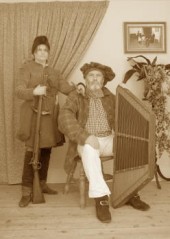'What is Old Time Music' by Mike Seeger: "After Native Americans, the first people to settle in this region came from the British Isles in the mid-1700's. These early settlers included Scots-Irish but were primarily English. A small number of immigrants later came to this area from Germany. Communities were also nearly self sufficient culturally, and almost everyone could either sing, play an instrument, dance, or tell a story, usually in a style distinctly their own. English-language culture was dominant." // http://mikeseeger.info/html/whatis.html // // The Early Settlers of Appalachia: "Many Ulster-Scots left the British Isles and came to America in the early 18th century. They came to Maryland and Pennsylvania but found the lands along the Delaware and the Chesapeake taken by earlier settlers from England; therefore, they moved west following the Great Appalachian Valley, moving southward into the piedmont and mountains of Virginia, North Carolina, and Tennessee.
These early settlers were descendents of hardy Scots who had survived many years of struggle against invaders who, time after time, had pushed them back into the hill country of Scotland but had never conquered them. Over the centuries of struggles they became great warriors with more of a love of liberty than life. Forced to live in the mountainous lands of the Scotland, they were sustained only through hard work and frugal living." DLEnnis // // ‘Appalachian Celts And Their Music’ by Charles H Ball: "When the Celtic people settled the Appalachian region they had their hands full: Indians, bears, wilderness, weather, topography you name it. They were not inclined to worry much about their roots, except the ones they planted in the ground. All they knew was that they had escaped tyranny, poverty, and oppression of one kind or another and were now planted in a new world, a world they had yet to conquer. And this conquest would be a full-time job. Today, three centuries later, most of their descendants have no sense of being Irish, or Scots-Irish, or Welsh, or Scottish." // http://www.leyline.org/cra/articles/app_celts_music.html // // 'Fiddle Tunes of the Old Frontier' by Alan Jabbour "I had supposed that the repertory and style in the Upper South were originally 'British', and then by new composition and gradual stylistic evolution became more regionally distinctive. But as the other elements of my original model were eroded, I began to contemplate the possibility that the Southern fiddling style I was documenting in the 20th century took shape much earlier than I had originally imagined. In particular, I reflected on the bowing patterns I had been laboriously transcribing from my fiddling mentors. Many of them used bowing patterns in which were imbedded elaborate forms of syncopation. Now it should be stipulated that syncopation has many forms. Any performance that establishes one rhythmic pattern, then superimposes a different pattern in contradistinction to the original pattern, is using syncopation. But the syncopated bowing patterns of my fiddling mentors were precisely what we all think of as “American syncopation,” appearing in jazz and popular music and commonly presumed to be an African American contribution to our musical heritage." // http://www.alanjabbour.com/fiddle_tunes_old_frontier.html // // "Old-time (oldtimey) Music What is it? "The early days of old-time music are unfortunately not well-documented, and there are various theories of how it started and spread. This first one I got from Bob Flesher. White minstrels popularized the banjo in urban centers before the Civil War. The banjo went back to the mountains with veterans from that war. When people began to play banjos and fiddles together, fiddle playing changed. After reading Conway's African Banjo Echoes in Appalachia, I would lean toward another theory. Conway gives persuasive evidence that black banjo players taught both minstrels and white mountain musicians to play the banjo directly. Just one of her arguments is that there are lots of common tunings between earlier black banjoists and mountain banjoists that weren't used by minstrels." // http://www.traditionalmusic.co.uk/whatisoldtime/old-time-music-definition.htm // //
An Appalachian Journey .
To Hear Your Banjo Play - 1947 .
. Traditional Music Program and Passing the Pick & Bow
.
Appalachian Clogging .
Tom Collins of New Hot Times playing Sally Ann
.
Neckbeard .
Flat Mountain Girls
.
Rebekah Weiler
.
The Flatbroke Stringband
.
Big Hungry Joe
*
Kate Lissauer .
. . "We are all the children of one God." Geronimo, Apache . Background Photo By IrishViews.comLayout By IrishMyspace.com
